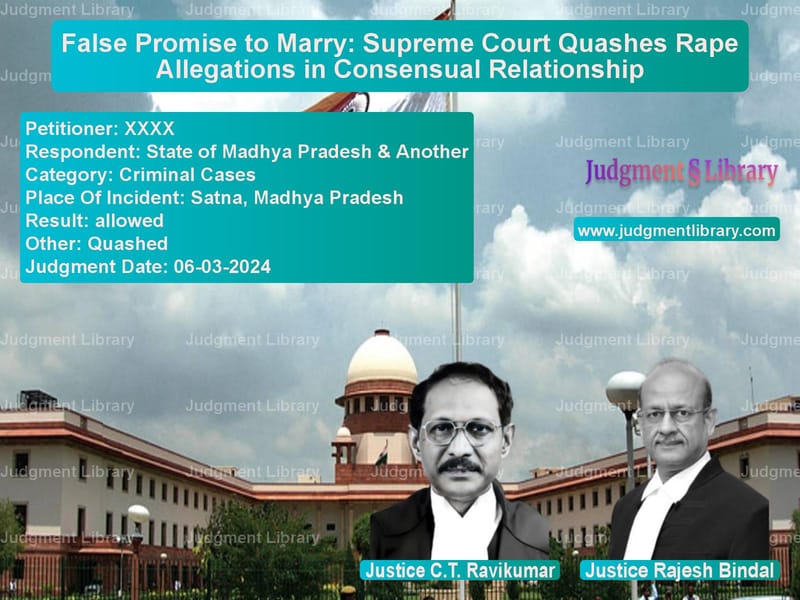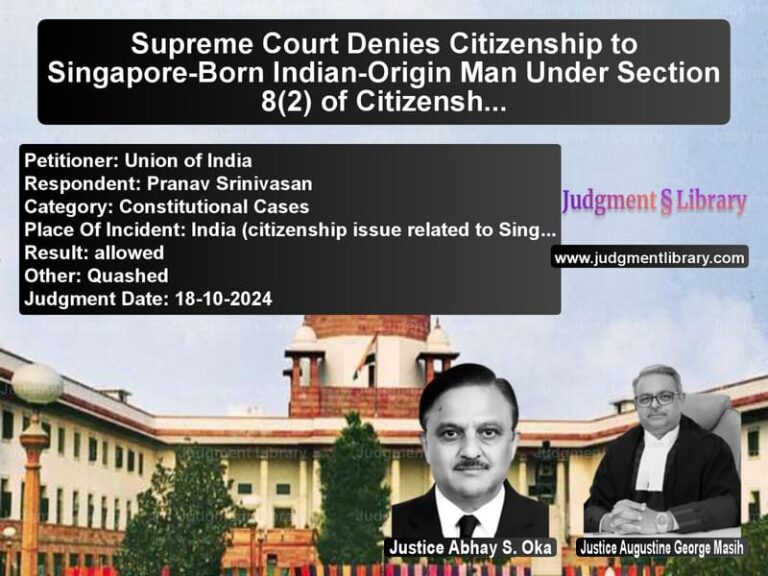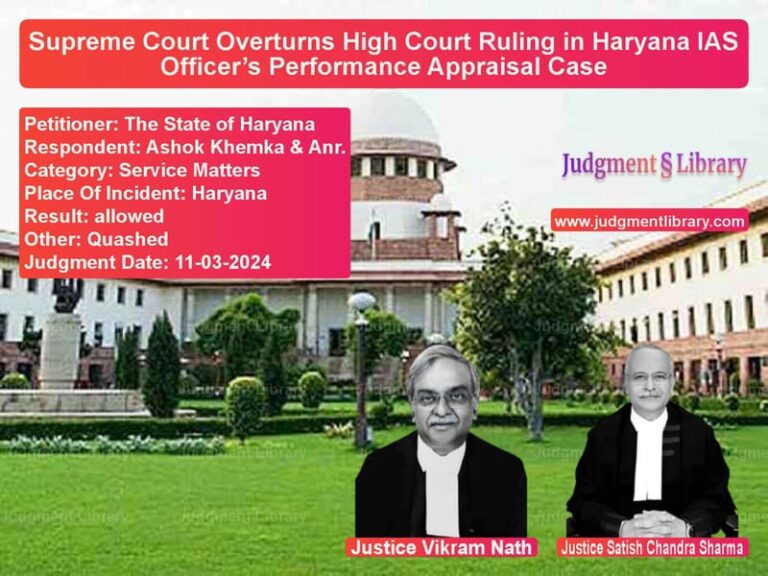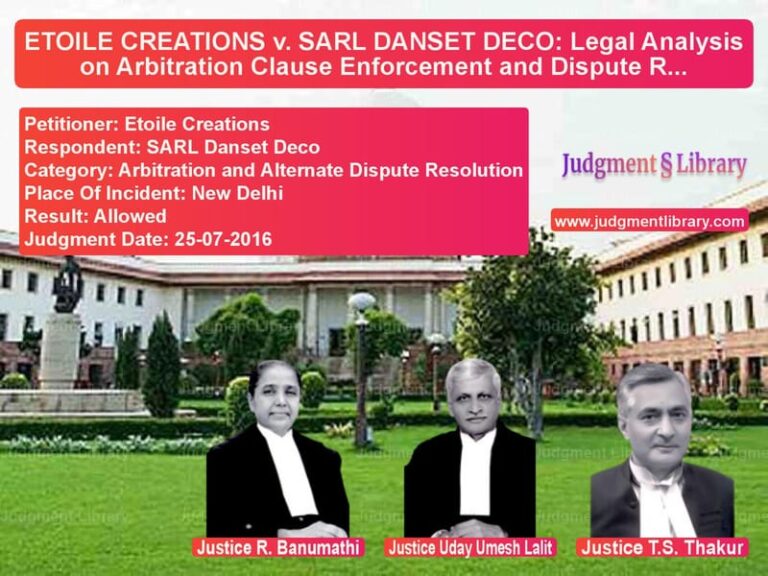False Promise to Marry: Supreme Court Quashes Rape Allegations in Consensual Relationship
The Supreme Court of India recently quashed rape charges filed against an accused based on allegations of sexual relations under a false promise of marriage. The case, XXXX vs. State of Madhya Pradesh & Another, examined whether a long-term consensual relationship between two adults could amount to rape under Section 376(2)(n) IPC when one party later refused to marry.
The Court ruled that the relationship was consensual and that the complainant, an adult woman with a 15-year-old daughter, was mature enough to understand the nature of her actions. Furthermore, the Court found inconsistencies in her statements regarding her marital status and ruled that the complaint was an abuse of legal process.
Background of the Case
The case originated from an FIR registered on December 11, 2020, at the Mahila Thana Police Station, District Satna, Madhya Pradesh. The complainant alleged that the appellant had engaged in sexual relations with her under the false promise of marriage and later refused to marry her. The case was registered under Sections 376(2)(n) (rape on repeated occasions) and 506 (criminal intimidation) of the IPC.
The complainant, a woman with a grown-up daughter, stated that the accused was a tenant in her house and that they developed a relationship starting in 2017. She alleged that the appellant assured her that he would marry her if she divorced her husband, and they even had a temple marriage in 2019. However, she later discovered that the accused was not serious about marrying her.
Arguments by the Appellant
The appellant sought the quashing of the FIR, contending that:
- The relationship was consensual from the beginning.
- The complainant misrepresented her marital status, claiming she was divorced in 2018 when, in reality, her divorce decree was granted only in 2021.
- There was no initial promise of marriage, and their physical relations began before any such promise was allegedly made.
- The complainant was an adult, fully aware of her decisions, and had the consent of her family.
State’s Arguments
The prosecution opposed the petition, arguing that:
- A charge sheet had already been filed, and courts should be slow in quashing FIRs at this stage.
- The complainant had been misled by a false promise of marriage, which resulted in the accused exploiting her trust.
- The accused stopped responding to the complainant’s calls and ultimately refused to marry her.
Supreme Court’s Observations
The Supreme Court analyzed the case in detail and found key contradictions in the complainant’s statements:
- In her FIR, she stated that she was divorced on December 10, 2018, and had a temple marriage with the accused in January 2019. However, her actual divorce decree was granted on January 13, 2021.
- She alleged that the accused promised to marry her after she got divorced, yet they were in a relationship since 2017.
- She was not an immature individual; she was older than the accused and had a teenage daughter, showing that she was fully capable of making informed decisions.
- Her parents and daughter were aware of the relationship and did not object to it.
The Court held that the complainant’s allegations were clearly contradictory and did not establish a case of rape based on a false promise of marriage. It stated:
“The complainant was a mature woman who knowingly entered into a physical relationship. It is not a case where she was misled into believing something untrue.”
Legal Precedents Cited
The Supreme Court relied on earlier judgments, particularly:
- Naim Ahamed vs. State (NCT of Delhi) (2023 SCC OnLine SC 89) – Held that a married woman with children, who knowingly engages in a relationship, cannot later claim rape based on a false promise of marriage.
- Prashant Bharti vs. State (NCT of Delhi) (2013) 9 SCC 293 – Highlighted the importance of quashing false rape allegations when inconsistencies in statements are evident.
Final Verdict
The Supreme Court allowed the appeal and quashed the FIR, stating:
“The case does not meet the legal threshold for rape. The FIR, filed as an afterthought, is an abuse of legal proceedings.”
Conclusion
The judgment reinforces the principle that consensual relationships between adults should not be misused to file false rape allegations. It establishes that a false promise to marry cannot be grounds for a rape charge when the complainant is mature, aware, and voluntarily engaged in the relationship. The ruling serves as a safeguard against the misuse of rape laws and upholds the need for fairness in legal proceedings.
Petitioner Name: XXXX.Respondent Name: State of Madhya Pradesh & Another.Judgment By: Justice C.T. Ravikumar, Justice Rajesh Bindal.Place Of Incident: Satna, Madhya Pradesh.Judgment Date: 06-03-2024.
Don’t miss out on the full details! Download the complete judgment in PDF format below and gain valuable insights instantly!
Download Judgment: xxxx-vs-state-of-madhya-prad-supreme-court-of-india-judgment-dated-06-03-2024.pdf
Directly Download Judgment: Directly download this Judgment
See all petitions in Rape Cases
See all petitions in Judgment by C.T. Ravikumar
See all petitions in Judgment by Rajesh Bindal
See all petitions in allowed
See all petitions in Quashed
See all petitions in supreme court of India judgments March 2024
See all petitions in 2024 judgments
See all posts in Criminal Cases Category
See all allowed petitions in Criminal Cases Category
See all Dismissed petitions in Criminal Cases Category
See all partially allowed petitions in Criminal Cases Category







